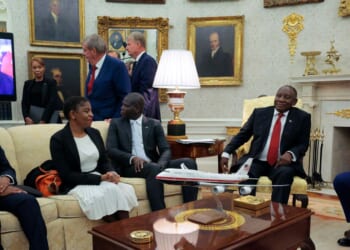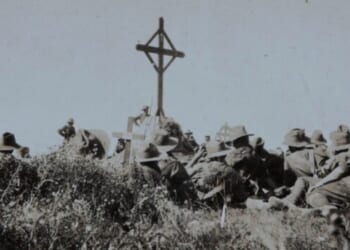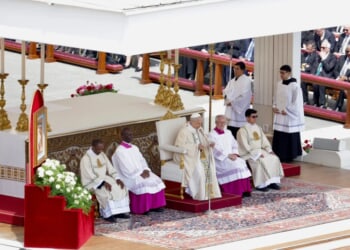Back in January 2023, Canada signed a contract to purchase eighty-eight F-35A fighters.
Whether one loves U.S. president Donald Trump or hates him, his blunt and brash leadership style has yielded both positive and negative results alike for America’s relations with its NATO allies.
For example, Trump’s renewed call for NATO member states to spend 5 percent of their gross domestic product (GDP) on defense has led the Baltic states (and former Soviet Republics) of Estonia and Lithuania as well as Western European nations such as Belgium and Germany to increase their defense spending. Regarding Belgium in particular, that newfound commitment to boosting defense spending includes purchasing America’s prestigious Lockheed Martin’s F-35 Lightning II fifth-generation jet fighter.
These successes come in contrast to other states like Portugal, which has reacted negatively to Trump’s demands. Portugal’s outgoing defense minister, Nuno Melo, out of displeasure cast doubt upon whether Lisbon would follow the recommendation of the Portuguese Air Force to purchase the F-35.
And now, America’s biggest (in terms of physical size) and closest (in terms of geographical proximity) NATO partner is also having second thoughts about buying the F-35: Canada.
Canada’s F-35 Contract Basics
Back in January 2023, the Canadian government signed a contract to purchase eighty-eight F-35s—specifically the F-35A variant—to bolster and modernize the Royal Canadian Air Force’s (RCAF) fighter jet fleet. According to the World Directory of Modern Military Aircraft, the RCAF currently consists of seventy-two CF-188A Hornets (the RCAF-modified edition of the old-school American-made McDonnell Douglas F/A-18 Hornet) and seven Hornets retaining the original U.S. F/A-18A designation.
According to the Government of Canada’s official acquisition announcement, deliveries of the stealth warbirds were scheduled as follows:
- First four airframes in 2026
- Six in 2027
- Six more in 2028
- Full remainder of the fleet is slated to arrive in time to enable the phase-out of the CF-18s by the end of 2032.
Canada Is Having Second Thoughts About the F-35
However, as noted by an essanews.com article reshared on MSN on or about May 16, 2025, titled “Canada committed to F-35 deal despite contract doubts,” Canada’s senior leadership is starting to have second thoughts about that Lightning II contract deal. Therein, the author, who uses the pseudonym of “MT,” notes that this past March, the Canadian government “had begun the process of reviewing the contract.”
It certainly doesn’t help that Trump continues to talk of making Canada the fifty-first state; that rhetoric, along with the threats of tariffs, is heavily credited with helping Canada’s Liberal Party retain the prime minister’s seat via Mark Carney’s March 2025 election victory in spite of the huge unpopularity of Carney’s immediate predecessor, Justin Trudeau.
Besides displeasure with Trump, another source of misgivings about the F-35 has been the spate of horror stories and nasty rumors about the F-35 having a “kill switch” that can supposedly instantly disable it.
That said, the “process of reviewing the contract” doesn’t carry the strong negative connotation that, say, the aforementioned Portuguese defense minister’s pronouncements did. Moreover, as “MT” notes, legal commitments to transfer funds for the first sixteen of the Lightning II airframes have been accepted, so any hypothetical withdrawal from the contract would only concern the remaining seventy-two planes.
From there, “MT” goes on to cite former U.S. Army special forces Chief Warrant Officer 2 and current military analyst Steve Balestrieri, who opines that it would be both legally infeasible and strategically unwise for Canada to renege on the remaining portion of the F-35 deal. For good measure, Steve adds:
“The F-35 offers indispensable fifth-generation capabilities crucial for Canada: superior stealth, advanced sensor fusion, seamless NORAD integration, and emerging abilities like controlling Collaborative Combat Aircraft (CCAs).”
One RCAF Veteran’s Perspectives
Billie Flynn is a retired RCAF lieutenant colonel who served in uniform for twenty-three years. Amongst his career accomplishments: the first CF-18 Hornet “pipeliner” pilot selected to fly that warbird back in 1984; twenty-five combat missions in the CF-18; and the commanding officer of the “Balkan Rats” for combat deployment to Aviano Air Base, Italy as part of Operation Allied Force (the 1999 Kosovo air campaign). After his retirement from the RCAF, Lt. Col. (ret.) Flynn spent seventeen years for Lockheed Martin Skunk Works as an F-35 test pilot and is currently a test pilot for ICE Leadership Inc. (not to be confused with the U.S. federal law enforcement agency).
Though Billie is no Trump fan by any stretch of the imagination, he remains a firm proponent of Canada’s purchase of the F-35 and bluntly opposes the notion of the contract being canceled on account of petty politics. As he recently stated on his LinkedIn page:
“The ‘Armageddonists’ will be so disappointed, but in the end, the Canadian F-35 contract will not be cancelled. Despite debates on social media, opinion pieces, podcasts, and interviews, nothing will change. Different reviews ordered by Prime Minister Carney will be conducted objectively and transparently, and the final verdict will confirm that the Lockheed Martin F-35 contract should continue as planned. Prime Minister Carney, with his PhD in economics, will see the economic benefits and will not waste millions of dollars on a less capable fighter driven by emotion rather than logic. He will trust the experts’ review and uphold the original contract. The naysayers will argue, and disinformation may spread, but no legitimate, experienced expert will dissent.”
Many thanks for that perspective, Billie! Time will tell if your optimistic prediction proves prescient.
About the Author: Christian D. Orr
Christian D. Orr was previously a Senior Defense Editor for National Security Journal (NSJ) and 19FortyFive. He is a former Air Force Security Forces officer, Federal law enforcement officer, and private military contractor (with assignments worked in Iraq, the United Arab Emirates, Kosovo, Japan, Germany, and the Pentagon). Chris holds a B.A. in International Relations from the University of Southern California (USC) and an M.A. in Intelligence Studies (concentration in Terrorism Studies) from American Military University (AMU). He has also been published in The Daily Torch, The Journal of Intelligence and Cyber Security, and Simple Flying. Last but not least, he is a Companion of the Order of the Naval Order of the United States (NOUS). If you’d like to pick his brain further, you can ofttimes find him at the Old Virginia Tobacco Company (OVTC) lounge in Manassas, Virginia, partaking of fine stogies and good quality human camaraderie.
Image: DVIDS.
















